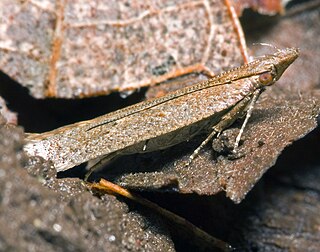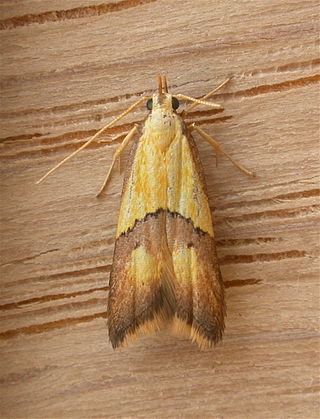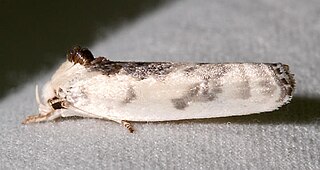
The Elachistidae are a family of small moths in the superfamily Gelechioidea. Some authors lump about 3,300 species in eight subfamilies here, but this arrangement almost certainly results in a massively paraphyletic and completely unnatural assemblage, united merely by symplesiomorphies retained from the first gelechioid moths.

The Gelechiidae are a family of moths commonly referred to as twirler moths or gelechiid moths. They are the namesake family of the huge and little-studied superfamily Gelechioidea, and the family's taxonomy has been subject to considerable dispute. These are generally very small moths with narrow, fringed wings. The larvae of most species feed internally on various parts of their host plants, sometimes causing galls. Douglas-fir (Pseudotsuga) is a host plant common to many species of the family, particularly of the genus Chionodes, which as a result is more diverse in North America than usual for Gelechioidea.

Gelechioidea is the superfamily of moths that contains the case-bearers, twirler moths, and relatives, also simply called curved-horn moths or gelechioid moths. It is a large and poorly understood '"micromoth" superfamily, constituting one of the basal lineages of the Ditrysia.

Cydia is a large genus of tortrix moths, belonging to the tribe Grapholitini of subfamily Olethreutinae. Its distinctness from and delimitation versus the tribe's type genus Grapholita requires further study.

Copromorphidae, the "tropical fruitworm moths", is a family of insects in the lepidopteran order. These moths have broad, rounded forewings, and well-camouflaged scale patterns. Unlike Carposinidae the mouthparts include "labial palps" with the second rather than third segment the longest. With other unusual structural characteristics of the caterpillar and adult, it could represent the sister lineage of all other extant members of this superfamily. The genus Sisyroxena from Madagascar is also notable for its unusual venation and wing scale sockets.

Spilomelinae is a very species-rich subfamily of the lepidopteran family Crambidae, the crambid snout moths. With 4,135 described species in 344 genera worldwide, it is the most speciose group among pyraloids.

The Plutellidae are a family of moths commonly known as the diamondback moths, named after the diamondback moth of European origin. It was once considered to have three subfamilies: Plutellinae, Praydinae, and Scythropiinae. Praydinae was later elevated to its own family, Praydidae, while Scythropiinae has variously been moved to Yponomeutidae or also elevated to its own family.

The Lecithoceridae, or long-horned moths, are a family of small moths described by Simon Le Marchand in 1947. Although lecithocerids are found throughout the world, the great majority are found in the Indomalayan realm and the southern part of the Palaearctic realm.

The Momphidae, or mompha moths, is a family of moths with some 115 described species. It was described by Gottlieb August Wilhelm Herrich-Schäffer in 1857. These moths tend to be rather small with a wingspan of up to 21 mm. The wings are held folded over the body at rest. The larvae are concealed feeders, either as leaf miners or within seeds or stems.
Prototheora is a genus of moths. It is the only genus of the Prototheoridae, or the African primitive ghost moths, a family of insects in the lepidopteran order, contained in the superfamily Hepialoidea. These moths are endemic to Southern Africa.

Omiodes is a moth genus in the family Crambidae. Several species are endemic to Hawaii.

Acleris is a genus of moths belonging to the subfamily Tortricinae of the family Tortricidae. As of 2007, about 241 species were known.

The Autostichinae are a subfamily of moths in the superfamily Gelechioidea. Like their relatives therein, their exact relationships are not yet very well resolved. The present lineage was often included in the concealer moth family (Oecophoridae), but alternatively it is united with the Symmocidae sensu stricto to form an expanded family Autostichidae.

Antaeotricha is a genus of moths. It is the largest genus in the subfamily Stenomatinae, numbering over 400 species in the Western Hemisphere.

Agonopterix is a moth genus of the superfamily Gelechioidea. It is placed in the family Depressariidae, which was often – particularly in older treatments – considered a subfamily of the Oecophoridae or included in the Elachistidae.

Autosticha is a genus of gelechioid moths. It belongs to the subfamily Autostichinae, which is either placed in the concealer moth family (Oecophoridae), or in an expanded Autostichidae. It is the type genus of its subfamily. Originally, this genus was named Automola, but this name properly refers to a fly genus in family Richardiidae.

Xyloryctidae is a family of moths contained within the superfamily Gelechioidea described by Edward Meyrick in 1890. Most genera are found in the Indo-Australian region. While many of these moths are tiny, some members of the family grow to a wingspan of up to 66 mm, making them giants among the micromoths.

Gracillariinae are a subfamily of moths which was described by Henry Tibbats Stainton in 1854.

Anacampsinae is a subfamily of moths in the family Gelechiidae.

Anomologinae is a subfamily of moths in the family Gelechiidae.
















